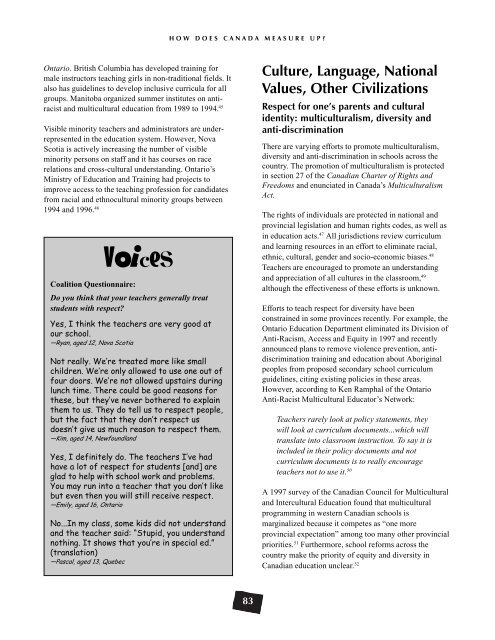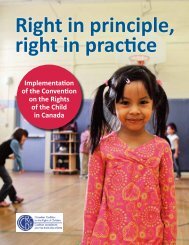Poste - Canadian Coalition for the Rights of Children
Poste - Canadian Coalition for the Rights of Children
Poste - Canadian Coalition for the Rights of Children
Create successful ePaper yourself
Turn your PDF publications into a flip-book with our unique Google optimized e-Paper software.
Ontario. British Columbia has developed training <strong>for</strong><br />
male instructors teaching girls in non-traditional fields. It<br />
also has guidelines to develop inclusive curricula <strong>for</strong> all<br />
groups. Manitoba organized summer institutes on antiracist<br />
and multicultural education from 1989 to 1994. 45<br />
Visible minority teachers and administrators are underrepresented<br />
in <strong>the</strong> education system. However, Nova<br />
Scotia is actively increasing <strong>the</strong> number <strong>of</strong> visible<br />
minority persons on staff and it has courses on race<br />
relations and cross-cultural understanding. Ontario’s<br />
Ministry <strong>of</strong> Education and Training had projects to<br />
improve access to <strong>the</strong> teaching pr<strong>of</strong>ession <strong>for</strong> candidates<br />
from racial and ethnocultural minority groups between<br />
1994 and 1996. 46<br />
Voices<br />
<strong>Coalition</strong> Questionnaire:<br />
Do you think that your teachers generally treat<br />
students with respect?<br />
Yes, I think <strong>the</strong> teachers are very good at<br />
our school.<br />
—Ryan, aged 12, Nova Scotia<br />
Not really. We’re treated more like small<br />
children. We’re only allowed to use one out <strong>of</strong><br />
four doors. We’re not allowed upstairs during<br />
lunch time. There could be good reasons <strong>for</strong><br />
<strong>the</strong>se, but <strong>the</strong>y’ve never bo<strong>the</strong>red to explain<br />
<strong>the</strong>m to us. They do tell us to respect people,<br />
but <strong>the</strong> fact that <strong>the</strong>y don’t respect us<br />
doesn’t give us much reason to respect <strong>the</strong>m.<br />
—Kim, aged 14, Newfoundland<br />
Yes, I definitely do. The teachers I’ve had<br />
have a lot <strong>of</strong> respect <strong>for</strong> students [and] are<br />
glad to help with school work and problems.<br />
You may run into a teacher that you don’t like<br />
but even <strong>the</strong>n you will still receive respect.<br />
—Emily, aged 16, Ontario<br />
No...In my class, some kids did not understand<br />
and <strong>the</strong> teacher said: “Stupid, you understand<br />
nothing. It shows that you’re in special ed.”<br />
(translation)<br />
—Pascal, aged 13, Quebec<br />
H O W D O E S C A N A D A M E A S U R E U P ?<br />
83<br />
Culture, Language, National<br />
Values, O<strong>the</strong>r Civilizations<br />
Respect <strong>for</strong> one’s parents and cultural<br />
identity: multiculturalism, diversity and<br />
anti-discrimination<br />
There are varying ef<strong>for</strong>ts to promote multiculturalism,<br />
diversity and anti-discrimination in schools across <strong>the</strong><br />
country. The promotion <strong>of</strong> multiculturalism is protected<br />
in section 27 <strong>of</strong> <strong>the</strong> <strong>Canadian</strong> Charter <strong>of</strong> <strong>Rights</strong> and<br />
Freedoms and enunciated in Canada’s Multiculturalism<br />
Act.<br />
The rights <strong>of</strong> individuals are protected in national and<br />
provincial legislation and human rights codes, as well as<br />
in education acts. 47 All jurisdictions review curriculum<br />
and learning resources in an ef<strong>for</strong>t to eliminate racial,<br />
ethnic, cultural, gender and socio-economic biases. 48<br />
Teachers are encouraged to promote an understanding<br />
and appreciation <strong>of</strong> all cultures in <strong>the</strong> classroom, 49<br />
although <strong>the</strong> effectiveness <strong>of</strong> <strong>the</strong>se ef<strong>for</strong>ts is unknown.<br />
Ef<strong>for</strong>ts to teach respect <strong>for</strong> diversity have been<br />
constrained in some provinces recently. For example, <strong>the</strong><br />
Ontario Education Department eliminated its Division <strong>of</strong><br />
Anti-Racism, Access and Equity in 1997 and recently<br />
announced plans to remove violence prevention, antidiscrimination<br />
training and education about Aboriginal<br />
peoples from proposed secondary school curriculum<br />
guidelines, citing existing policies in <strong>the</strong>se areas.<br />
However, according to Ken Ramphal <strong>of</strong> <strong>the</strong> Ontario<br />
Anti-Racist Multicultural Educator’s Network:<br />
Teachers rarely look at policy statements, <strong>the</strong>y<br />
will look at curriculum documents...which will<br />
translate into classroom instruction. To say it is<br />
included in <strong>the</strong>ir policy documents and not<br />
curriculum documents is to really encourage<br />
teachers not to use it. 50<br />
A 1997 survey <strong>of</strong> <strong>the</strong> <strong>Canadian</strong> Council <strong>for</strong> Multicultural<br />
and Intercultural Education found that multicultural<br />
programming in western <strong>Canadian</strong> schools is<br />
marginalized because it competes as “one more<br />
provincial expectation” among too many o<strong>the</strong>r provincial<br />
priorities. 51 Fur<strong>the</strong>rmore, school re<strong>for</strong>ms across <strong>the</strong><br />
country make <strong>the</strong> priority <strong>of</strong> equity and diversity in<br />
<strong>Canadian</strong> education unclear. 52




